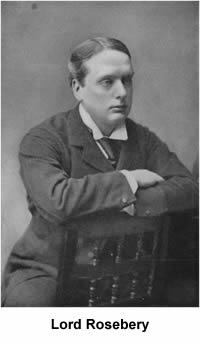
Buchanan on Churchill and the Entente Cordiale of 1904
Scott Manning
June 21, 2008
|
 In Churchill, Hitler, and "The Unnecessary War", Patrick J. Buchanan identifies the Entente Cordiale of 1904 as one of Great Britain's avoidable milestones on the road leading to World War I. In Churchill, Hitler, and "The Unnecessary War", Patrick J. Buchanan identifies the Entente Cordiale of 1904 as one of Great Britain's avoidable milestones on the road leading to World War I.
The Entente Cordiale (translated as "cordial agreement") was a series of agreements signed by Great Britain and France. While these agreements were seen as non-binding (Manchester, 467), they did bring Great Britain into disputes between France and Germany.
- Buchanan insinuates that Churchill agrees with his analysis that these cordial agreements were a mistake. In reality, Churchill thanked God for them.
- Buchanan leads the reader to believe that Churchill not only saw the agreements as unnecessary, but that he had zero regrets for their role in leading to war. The truth is that Churchill looked back on World War I as an event that was destined to happen regardless of the Entente Cordiale.
One Man Opposed the Entente Cordiale

After discussing the Entente Cordiale, Buchanan describes its early effects when Great Britain backed France during a 1905 conference over African territorial disputes with Germany. Great Britain was becoming less isolated and becoming more involved with the affairs of other empires.
Buchanan then brings up Churchill, who was not involved whatsoever with the Entente Cordiale.
As Churchill wrote decades later, only Lord Rosebery read the real meaning of the Anglo-French entente. "Only one voice - Rosebery's - was raised in discord: in public 'Far more likely to lead to War than Peace'; in private 'Straight to War.'" While praising Rosebery's foresight, Churchill never repudiated his own support of the entente or secret understandings: "It must not be thought that I regret the decisions which were in fact taken." (Buchanan, p. 7)
Buchanan is quoting Churchill's 1937 book Great Contemporaries in which he gives brief biographies of prominent leaders that had lived during Churchill's lifetime. These people include Emperor William II (the Kaiser of Germany during World War I), Lawrence of Arabia, Hitler, and Lord Rosebery.
Lord Rosebery was the Prime Minister of England for just over a year (1894-1895). Even though he was not in the cabinet when the Entente Cordiale was signed, Lord Rosebery was still in politics. Churchill spent time with him over the years and remembered him fondly.
"Praising Rosebery's foresight" as Buchanan puts it is a strong sentiment. A more accurate description was that he admired it. Above all, Churchill was admiring Lord Rosebery's courage as the only man to speak about his concerns in public. At the time the book was published (1937), Churchill had spent a considerable amount of effort expressing concern over Hitler when the ruling politicians did not want to hear about it.
Even though he admired Lord Rosebery's courage to speak out against the Entente Cordiale, Churchill did not agree with him. From the same book that Buchanan quotes, Churchill said:
It must not be thought that I regret the decisions which were in fact taken. I did not think that any movements on the European chessboard could have prevented the challenge to world peace sooner or later of the ever-growing overweening military power and temper of Germany. The occasion would have been different, the hour might have been delayed, the grouping of Powers might not have been the same; but given the world as it was at the beginning of the nineteenth century, I doubt if anything could have averted the hideous collision. And if it had to come, we must thank God it came in such a way that the world was with us through the conflict. (Churchill, p. 16)
Churchill was saying that although Lord Rosebery was right about the coming of war, war was destined to come. Churchill thanked God that such an agreement as the Entente Cordiale of 1904 was in place, no matter how non-binding it was, because it helped unify countries like Great Britain and France to fight Central Powers.
Again, when you consider the context of the quote provided by Buchanan and remove the analysis, a completely different picture is revealed.
Lord Rosebery the Patriot for War

It should also be noted that Lord Rosebery's sentiments towards a coming war did not remain when the war finally arrived. Rosebery had stated that Great Britain was "backing the wrong horse" in the signing of the Entente Cordiale, but when the war started, he joined the recruiting movement. (Raymond. p. 228)
While trying to rally the nation, he stated in a speech given on September 5, 1914 that "If we were beaten, if we were to sink to be a third-rate power, I for one would from my heart and soul rather that all our people were to pass into exile or into death and leave this island vacant for some superior race." (Raymond, p. 228)
With Lord Rosebery's foresight, he still supported his country when the war arrived.
References

Buchanan, Patrick J. Churchill, Hitler, and "The Unnecessary War". New York: Crown Publishing Group, 2008.
Churchill, Winston S. Great Contemporaries . New York: G.P. Putnam's sons, 1937. . New York: G.P. Putnam's sons, 1937.
Manchester, William. The Last Lion: Winston Spencer Churchill, Visions of Glory, 1874-1932 . New York: Little, Brown, and Company, 1983. . New York: Little, Brown, and Company, 1983.
Raymond, E. T. The Life Of Lord Rosebery . New York: George H. Doran Company, 1923. . New York: George H. Doran Company, 1923.
More on the "Unnecessary War"

The commentary on Patrick J. Buchanan's book doesn't stop here. We've discovered more questionable historical analysis, hacked quotes, copied maps, and flat-out mistakes in the book. Read more here.
|
